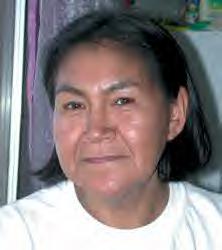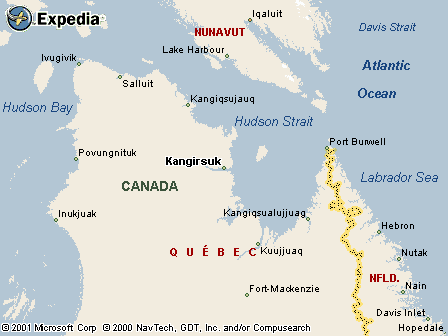|
|
Canku Ota |
|
|
(Many Paths) |
||
|
An Online Newsletter Celebrating Native America |
||
|
July 28, 2001 - Issue 41 |
||
|
|
||
|
A Passion for Translation |
||
|
by Miriam Hill Nunatsiaq News-July 20, 2001 |
||
|
Photo of Martha Kauki of Kangirsuk.by Miriam Hill |
 KANGIRSUK
ó Martha Kauki says she sometimes gets so wrapped up in her job, she doesnít realize what sheís doing. KANGIRSUK
ó Martha Kauki says she sometimes gets so wrapped up in her job, she doesnít realize what sheís doing."If the speaker puts up his hand," she says, gesturing in her Kangirsuk kitchen, "I put up my hand. If he bangs the table, I bang the table. If he starts bawling, Iíll start bawling." Kauki, 48, is a self-employed interpreter-translator and has a real passion for her work, even though she finds simultaneous interpreting the most difficult. "You really have to be into it," she says. "And you have to be serious." She says sheís known people who have tried it and failed because they didnít have a passion for it. Kauki was born in a tent just down the road from where she now lives with her three children in Kangirsuk. Sheís been hosting relatives at her home and apologizes for its disheveled appearance. During the summer, she says, things are a bit slower in the translation business as there are fewer public meetings, but she still has some documents to proof for the Makivik Corporationís newsletter. Controlling bias Kauki represents Kangirsuk on Makivikís board of directors, and she says it can sometimes be a challenge when sheís called to interpret for their meetings, and to keep her bias from showing. "Itís hard when youíre translating something you donít necessarily believe," she says. "I have to separate myself, I canít put any of my own ideas in when translating." After learning English at the federal day school in Kangirsuk, she first began translating back in 1974 during negotiations for the James Bay agreement. She mostly translates English to Inuktitut, but can go both ways. "Unfortunately I havenít learned French," she smiles as she takes fish sticks out of the freezer for lunch. The desk and computer she uses for her work are set up next to the kitchen table, so sheís easily accessible, she explains. Terminology development Kauki is involved with language development workshops with elders where experts in a specific field Ė say politics, recreation, or science ó come to explain in English what a word means. Kauki then translates that explanation to the elders who tell her if there is an equivalent word in Inuktitut. If there isnít, a new word or phrase is developed. That information is put into a database administered by the Avataq Cultural Institute. Self-employed since 1986, she works on contract and has travelled extensively throughout Nunavik, with some travel in Nunavut. Thereís always a shortage of interpreters, she says, but the pay is good. "But you have to take care of a lot of expenses the employer normally would," she says. "And Iím a single parent, I have to look after my kids." Beside Kaukiís fridge hang two footprints made in paint on a small card. She explains they come from a one-year-old she was fostering who was just returned to his parents after seven months. Before embarking on a simultaneous translation job, she practises first with the TV. "If youíre familiar with the issues, itís a lot easier," she says. "Recently I did a hospital board meeting and Iím not used to those words, so it was hardÖ one time I did a scientific one and that really blew my mind." She says the trick is to not get stuck on one word because you lose track of what the speaker is saying. After a week of simultaneous translation there is little energy left, she admits, and everything seems hysterically funny. Kauki says thereís no retirement in sight for her yet. Sheís been offered other jobs and has turned them down, but admits when her children go to college in the South, she may tag along with them. Law may be her next passion. |
|
|
|
Kangirsuk |
|
|
||
|
|
||
| Canku Ota is a free Newsletter celebrating Native America, its traditions and accomplishments . We do not provide subscriber or visitor names to anyone. Some articles presented in Canku Ota may contain copyright material. We have received appropriate permissions for republishing any articles. Material appearing here is distributed without profit or monetary gain to those who have expressed an interest. This is in accordance with Title 17 U.S.C. section 107. | ||
|
Canku Ota is a copyright © 2000, 2001 of Vicki Lockard and Paul Barry. |
||
|
|
|
|
|
The "Canku Ota - A Newsletter Celebrating Native America" web site and its design is the |
||
|
Copyright © 1999, 2000, 2001 of Paul C. Barry. |
||
|
All Rights Reserved. |
||

